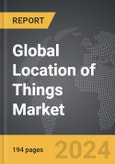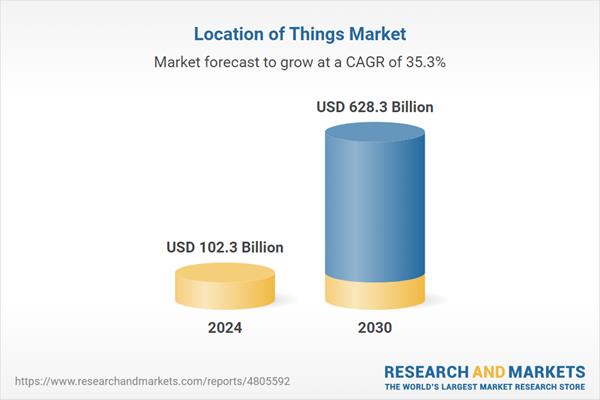Global Location of Things Market - Key Trends & Drivers Summarized
How Is the Location of Things Enhancing Connectivity Across Industries?
The Location of Things (LoT) refers to the integration of location-based data into Internet of Things (IoT) applications, enhancing the ability of devices to communicate with each other in context to their position. This technology enables businesses and consumers to locate physical objects, track movement, and gather contextual data which is pivotal in various sectors such as logistics, retail, and smart cities. For example, in logistics, LoT facilitates real-time tracking of goods throughout the supply chain, enhancing operational efficiency and reducing costs. In smart cities, LoT technologies help manage everything from traffic congestion to public safety, significantly improving urban living conditions.What Are the Technological Drivers for LoT Adoption?
The rapid advancements in GPS and RFID technology are critical drivers behind the adoption of LoT. These technologies provide the backbone for accurate and reliable location data, which is essential for the effective implementation of LoT applications. Additionally, the widespread adoption of smartphones and wearable technology, equipped with various sensors and high connectivity, has dramatically expanded the potential for LoT applications in everyday consumer products and services. As wireless technology continues to advance, particularly with the rollout of 5G networks, the accuracy and speed of data transmission in LoT systems are expected to improve, thereby enhancing their effectiveness and expanding their use cases.Why Is Interoperability Key in the Location of Things?
Interoperability is a major focus in the LoT space as it ensures that devices from different manufacturers or systems can communicate and work together seamlessly. Effective LoT applications require the integration of multiple technologies and platforms, from mobile devices and sensors to cloud computing services. Standardizing communication protocols and data formats across these platforms is crucial for the scalable deployment of LoT solutions. This interoperability not only promotes innovation by allowing developers to create versatile, cross-platform applications but also enhances the user experience by providing more cohesive and comprehensive services.What Drives the Growth of the Location of Things Market?
The growth in the Location of Things market is driven by several factors, primarily the increasing commercial need to gain deeper insights into asset utilization, operational efficiency, and consumer behavior. As businesses continue to recognize the value of geo-spatial data in enhancing decision-making, the demand for LoT technologies grows. The proliferation of connected devices, coupled with improvements in data processing and cloud computing, also fuels this expansion. Additionally, government initiatives aimed at enhancing public safety and urban planning increasingly rely on LoT solutions to provide accurate and actionable information. As technology advances, the potential applications of LoT in industrial, retail, and personal contexts are rapidly expanding, making it a critical component of future technological landscapes.Report Scope
The report analyzes the Location of Things market, presented in terms of market value (USD). The analysis covers the key segments and geographic regions outlined below.- Segments: Application (Mapping & Navigation, Location-Based Customer Engagement & Advertising Platform, Location-Based Social Media Monitoring, IoT Asset Management, Location Intelligence).
- Geographic Regions/Countries: World; United States; Canada; Japan; China; Europe (France; Germany; Italy; United Kingdom; and Rest of Europe); Asia-Pacific; Rest of World.
Key Insights:
- Market Growth: Understand the significant growth trajectory of the Mapping & Navigation Application segment, which is expected to reach US$244.2 Billion by 2030 with a CAGR of 34.2%. The Location-based Customer Engagement & Advertising Platform Application segment is also set to grow at 34.6% CAGR over the analysis period.
- Regional Analysis: Gain insights into the U.S. market, valued at $30.9 Billion in 2024, and China, forecasted to grow at an impressive 33.9% CAGR to reach $92 Billion by 2030. Discover growth trends in other key regions, including Japan, Canada, Germany, and the Asia-Pacific.
Why You Should Buy This Report:
- Detailed Market Analysis: Access a thorough analysis of the Global Location of Things Market, covering all major geographic regions and market segments.
- Competitive Insights: Get an overview of the competitive landscape, including the market presence of major players across different geographies.
- Future Trends and Drivers: Understand the key trends and drivers shaping the future of the Global Location of Things Market.
- Actionable Insights: Benefit from actionable insights that can help you identify new revenue opportunities and make strategic business decisions.
Key Questions Answered:
- How is the Global Location of Things Market expected to evolve by 2030?
- What are the main drivers and restraints affecting the market?
- Which market segments will grow the most over the forecast period?
- How will market shares for different regions and segments change by 2030?
- Who are the leading players in the market, and what are their prospects?
Report Features:
- Comprehensive Market Data: Independent analysis of annual sales and market forecasts in US$ Million from 2024 to 2030.
- In-Depth Regional Analysis: Detailed insights into key markets, including the U.S., China, Japan, Canada, Europe, Asia-Pacific, Latin America, Middle East, and Africa.
- Company Profiles: Coverage of players such as Aerial Data Service, Inc., Bumble, Deeyook, Enav S.P.A., Genius WIFI Holdings International Pty Limited and more.
- Complimentary Updates: Receive free report updates for one year to keep you informed of the latest market developments.
Some of the 42 companies featured in this Location of Things market report include:
- Aerial Data Service, Inc.
- Bumble
- Deeyook
- Enav S.P.A.
- Genius WIFI Holdings International Pty Limited
- Hellotracks
- Koninklijke Volker Wessels Stevin nv (VolkerWessels)
- NV5 Holdings, Inc.
- Passive Eye Ltd.
- Phoenix LiDAR Systems
This edition integrates the latest global trade and economic shifts into comprehensive market analysis. Key updates include:
- Tariff and Trade Impact: Insights into global tariff negotiations across 180+ countries, with analysis of supply chain turbulence, sourcing disruptions, and geographic realignment. Special focus on 2025 as a pivotal year for trade tensions, including updated perspectives on the Trump-era tariffs.
- Adjusted Forecasts and Analytics: Revised global and regional market forecasts through 2030, incorporating tariff effects, economic uncertainty, and structural changes in globalization. Includes historical analysis from 2015 to 2023.
- Strategic Market Dynamics: Evaluation of revised market prospects, regional outlooks, and key economic indicators such as population and urbanization trends.
- Innovation & Technology Trends: Latest developments in product and process innovation, emerging technologies, and key industry drivers shaping the competitive landscape.
- Competitive Intelligence: Updated global market share estimates for 2025, competitive positioning of major players (Strong/Active/Niche/Trivial), and refined focus on leading global brands and core players.
- Expert Insight & Commentary: Strategic analysis from economists, trade experts, and domain specialists to contextualize market shifts and identify emerging opportunities.
Table of Contents
Companies Mentioned (Partial List)
A selection of companies mentioned in this report includes, but is not limited to:
- Aerial Data Service, Inc.
- Bumble
- Deeyook
- Enav S.P.A.
- Genius WIFI Holdings International Pty Limited
- Hellotracks
- Koninklijke Volker Wessels Stevin nv (VolkerWessels)
- NV5 Holdings, Inc.
- Passive Eye Ltd.
- Phoenix LiDAR Systems
Table Information
| Report Attribute | Details |
|---|---|
| No. of Pages | 194 |
| Published | February 2026 |
| Forecast Period | 2024 - 2030 |
| Estimated Market Value ( USD | $ 102.3 Billion |
| Forecasted Market Value ( USD | $ 628.3 Billion |
| Compound Annual Growth Rate | 35.3% |
| Regions Covered | Global |









